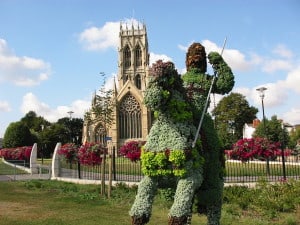It’s a well-known fact that medical staff have a language of their own, as anyone who has ever been in hospital and overheard exchanges between doctors and nurses can bear witness to. But a local General Practitioner has to be able to communicate clearly and directly with patients, and, most importantly, understand them. It’s highly unlikely that patients will walk into the surgery complaining of otitis media – they’ll complain of earache, or perhaps, as Austrian doctors working in a northern town in England have discovered, a noggling in the lugoil.[1]
Austrian doctors were flown into Doncaster, South Yorkshire[2], to remedy a shortage of GPs but, although speaking fluent Queen’s English, they soon found themselves dealing with unexpected serious problems communicating with the locals. In fact, the locals of Doncaster use many colloquialisms that are not present in other parts of the UK and to complicate things further the accent is strong and the “t” is usually dropped, except when abbreviating the definite article, for example, “going t’ shops”.
The stereotypical northerner finds it hard to express his or her emotions. Add to this the fact that in any case it can be difficult to open up to a doctor, especially on the first appointment or regarding an embarrassing problem, and it’s easy to envisage potential communication problems. The Austrian doctors were unable to understand the symptoms some of their northern patients were trying to describe.
The doctors were initially advised to watch films such as The Full Monty and Brassed Off[3], both set in working class communities in Yorkshire, to help them get to grips with the Yorkshire lingo. Although proving a great help – they could learn for example how to greet people (“Ay up”) and become acquainted with the accent – the local Primary Care Trust soon realised this would not suffice and that what was really lacking was an actual dictionary of medical terms: Yorkshire-English.
Medical diagnoses were soon made possible again thanks to the drafting of a “bilingual” (Yorkshire/English) handbook,, brainchild of Dr. Lis Rodger, in charge of foreign recruitment for the Doncaster Primary Care Trust: quite literally a lifesaver for all European doctors landing in the South Yorkshire area. Foreign and local GPs operating in the region were asked to contribute to the glossary by listing any regional terms or slang that had puzzled them over recent years.[4]
For the seven Spanish GPs due to hit South Yorkshire in the upcoming months it couldn’t have been compiled soon enough. They’ll not be baffled by a patient claiming to be “a tad in the dumps”.[5]
[1] Noggling: unspecific, chronic; lugoil: ear
[2] For more information on Doncaster visit https://en.wikipedia.org/wiki/Doncaster
[3] https://en.wikipedia.org/wiki/The_Full_Monty – https://en.wikipedia.org/wiki/Brassed_Off
[4] Just a few examples from the glossary:
Gipping: vomiting
Noggin: the head
Gripes: abdominal pain
Mardy – whinging (person in a bad mood)
[5] Tad: small amount
in the dumps: depressed
To read more about this in the press go to:
Doncaster Free Press (local newspaper)

